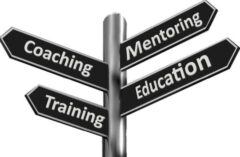Contact: 07512 143313
Life Coach and Mental Health Mentor in Belfast and Online
Life coaching and mental health mentoring both support personal and professional growth but they differ in focus and approach.
Life coaching is goal-oriented and structured. It targets specific skills or performance improvements within a set timeframe. Life coaches often ask questions to help clients reflect on their strengths, weaknesses and goals. They also provide support and act as accountability partners, enabling clients to identify their aspirations and create actionable plans to reach them.
Mental health mentoring, in contrast, is person-oriented, less structured and typically occurs over a longer period. More specifically, a mental health mentor is someone with experience in mental health who offers support and guidance to those facing issues. They provide a safe space for clients to share their experiences, learn coping strategies and develop resilience. Mental health mentors can help clients manage anxiety, depression and stress etc.
Session Guideline
IMPORTANT: The following is a fictitious scenario about a client approaching me and seeking help for dealing with stress. This illustrates how a typical 50-minute session MIGHT go. However, sessions are flexible and are guided by the clients needs and what emerges during the course of a session and so what follows should only be treated as a guide.
Session Outline
Introduction
- I would make sure that you feel safe, comfortable and are ready to begin the session.
- I would explain the purpose of the session and what you should expect.
- I might ask if you have any questions for me.
Identifying Sources of Stress
- I might ask you to ‘tell me what has been on your mind lately?’ or ‘can you describe what’s been causing you stress’?
- While you are talking, I will be actively listening so that I can gain a full understanding of what you are telling me and may seek clarification / ask questions.
Exploring Coping Mechanisms
- I might ask you to discuss how you are coping and what coping strategies, if any, you are using to deal with stress.
- We would explore the effectiveness of the current strategies and discuss any areas for improvement.
- I may suggest new coping techniques (e.g. mindfulness exercises, journaling or physical activities).
- I will encourage self-care practices, highlight the importance of self-compassion and remind you that it’s okay to seek help if or when needed.
Setting Goals
- I might help you to set realistic and achievable short-term goals to manage your stress.
- I might encourage you to identify specific actions you can take to address the source/s of stress.
- We might discuss how to track progress and celebrate small wins.
Building Support Systems
- We might talk about your current support networks and how to establish or develop more support networks.
- We might discuss resources that are available and how you can access them (e.g. websites, videos or local services).
Reflection
- I might highlight the key points discussed during the session so that you can reflect on learning points and look at ways of progressing.
Feedback
- I might ask you for feedback on the session and to discuss what you think worked well and what could be improved for future sessions.
Closing Session
- If necessary, we will schedule our next session to check on your progress and so that I can provide ongoing support.
Return to the home page or go to my story, services, testimonials or contact page.
Accessible and Affordable Psychologist, Life Coach & Mental Health Mentor in Belfast
Contact me on 07512 143313
Address (Strictly by appointment only):
Source Wellbeing Centre (Above Boots)
Room 4
330-336 (1st Floor)
Beersbridge Road
BT5 5DY

